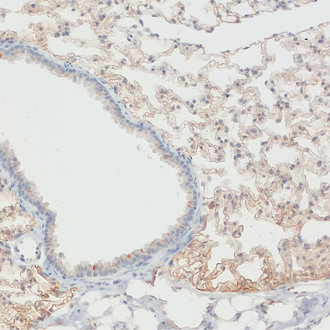
| Cat. No. HS-492 003 |
50 µg specific antibody, lyophilized. Affinity purified with the immunogen. Albumin and azide were added for stabilization. For reconstitution add 50 µl H2O to get a 1mg/ml solution in PBS. Then aliquot and store at -20°C to -80°C until use. Antibodies should be stored at +4°C when still lyophilized. Do not freeze! |
| Applications | |
| Immunogen | Synthetic peptide corresponding to residues surrounding AA 310 of mouse CD73 (UniProt Id: Q61503) |
| Reactivity |
Reacts with: mouse (Q61503). No signal: human (P21589), rat. Other species not tested yet. |
| Remarks |
IHC: Antigen retrieval with citrate buffer pH 6 is required. |
| Data sheet | hs-492_003.pdf |

CD73 is expressed on airway epithelial cells of the mouse lung
CD73, also known as NT5E (ecto-5′-nucleotidase), is a cell surface ectoenzyme involved in the conversion of ATP to extracellular adenosine together with CD39 (ENTPD1, ecto-nucleoside triphosphate diphosphohydrolase). CD39 degrades extracellular ATP to AMP, thereby providing the substrate for the conversion of AMP to adenosine by CD73 (1). ATP is present in high concentrations inside cells and is released from damaged cells into the extracellular space during tissue injury or inflammation, where it acts as “danger signal”. In contrast, extracellular adenosine mainly mediates anti-inflammatory effects (1). CD73 is expressed by several cell types, including T and B cell subsets, endothelial cells, and epithelial cells. Among T cells, CD73 is mainly expressed by regulatory T cells (Tregs), which mediate immune suppressive actions against dendritic cells, monocytes and effector T cells (2). In solid human tumors, high CD73 expression has been found to be closely associated with tumor invasiveness and metastasis. CD73 has recently shown promise as a target for novel immunotherapies (3).